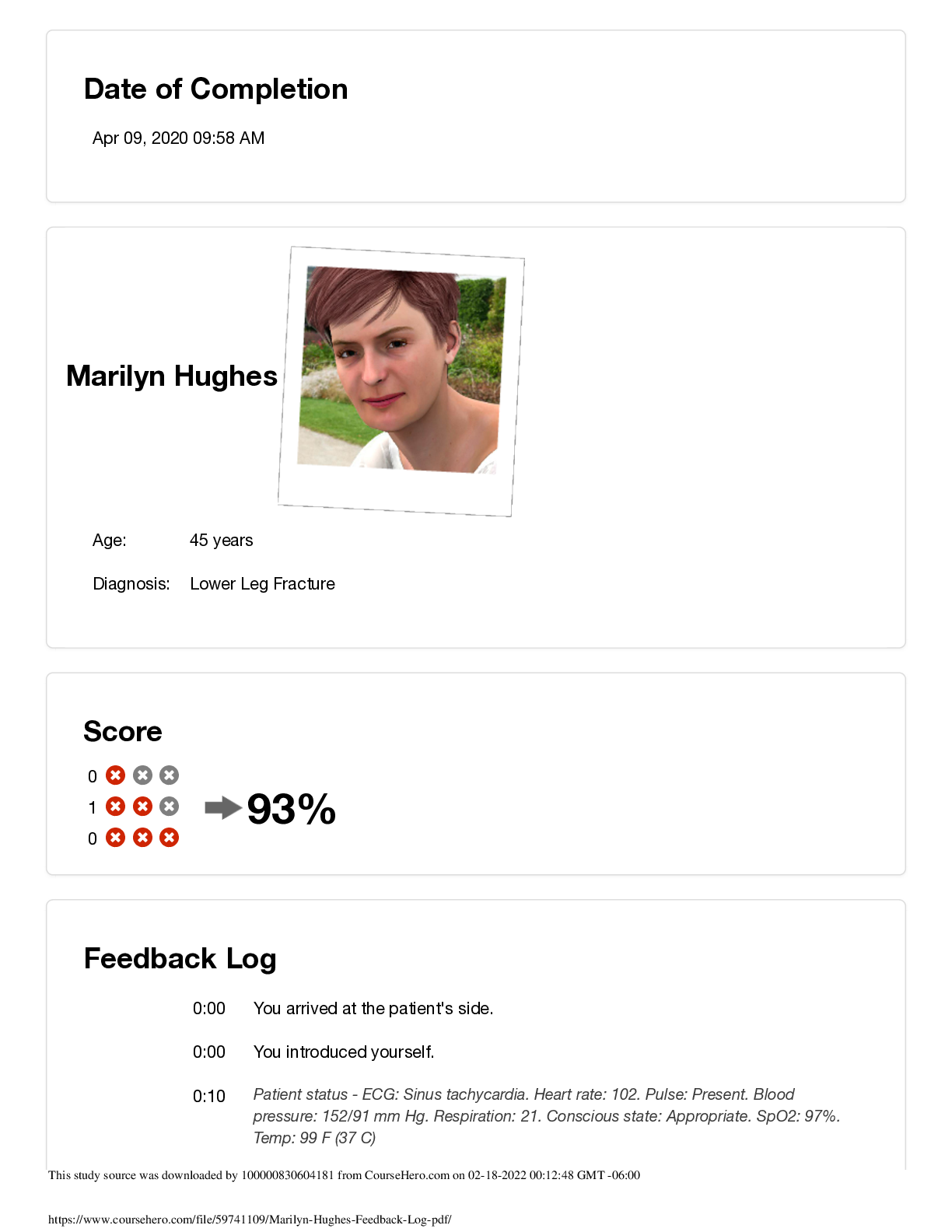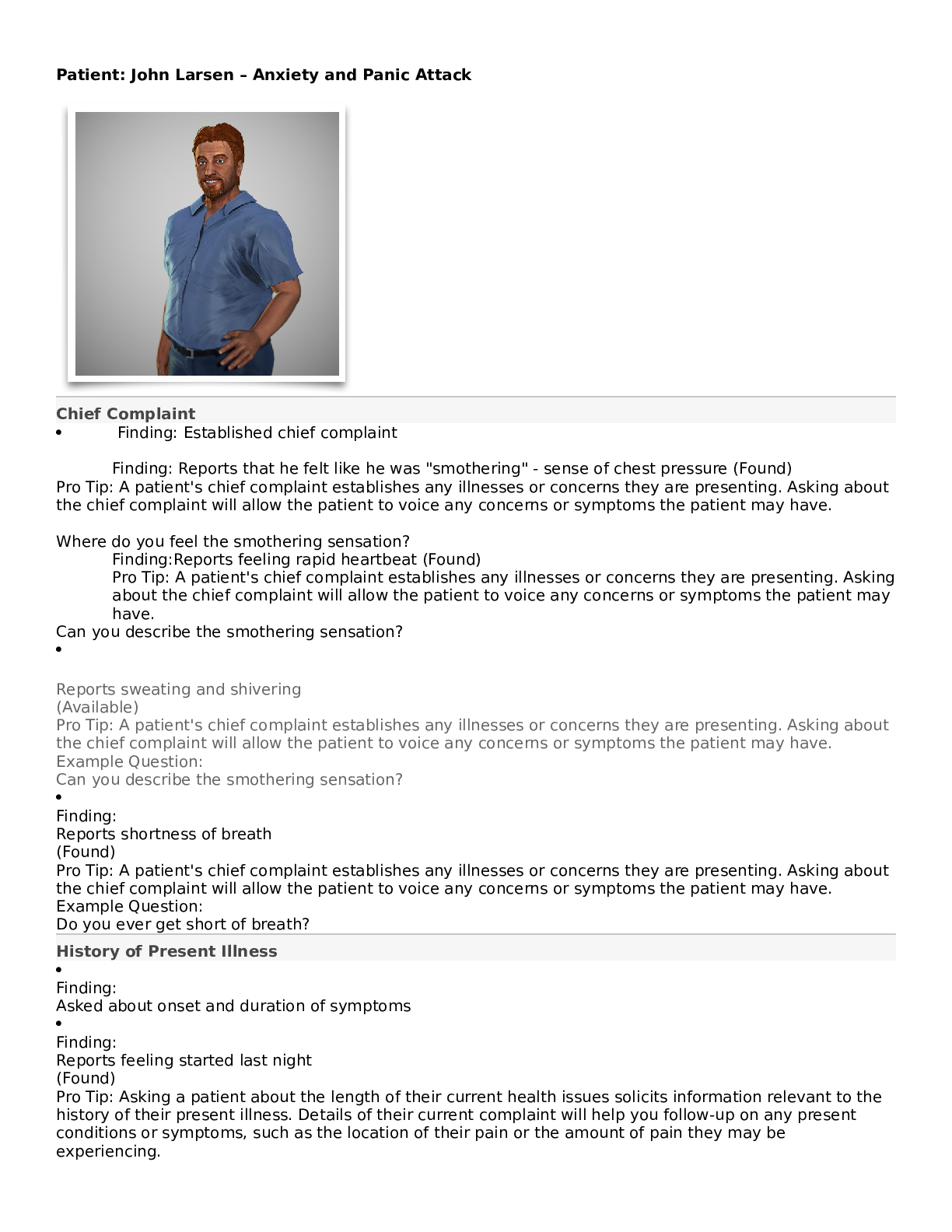Psychology > CASE STUDY > Western Governors University PSYCH C487 Shadow Health Abigail Harris (All)
Western Governors University PSYCH C487 Shadow Health Abigail Harris
Document Content and Description Below
Abigail Harris – Depression Chief Complaint Finding: Established chief complaint Finding: Reports feeling excessively weak (Found) Pro Tip: A patient's chief complaint establishes any illness... es or concerns they are presenting. Asking about the chief complaint will allow the patient to voice any concerns or symptoms the patient may have. Example Question: Do you feel weak? Finding: Reports fatigue and sleepiness (Found) Pro Tip: A patient's chief complaint establishes any illnesses or concerns they are presenting. Asking about the chief complaint will allow the patient to voice any concerns or symptoms the patient may have. Example Question: Are you fatigued? History of Present Illness Finding: Asked about onset and duration of symptoms Finding: Reports symptoms have been happening for past month (Found)Pro Tip: Asking a patient about the length of their current health issues solicits information relevant to the history of their present illness. Details of their current complaint will help you follow-up on any present conditions or symptoms, such as the location of their pain or the amount of pain they may be experiencing. Example Question: How often have you felt fatigued? Finding: Reports symptoms have been increasing in the past week (Found) Pro Tip: Asking a patient about the length of their current health issues solicits information relevant to the history of their present illness. Details of their current complaint will help you follow-up on any present conditions or symptoms, such as the location of their pain or the amount of pain they may be experiencing. Example Question: Did the discomfort start gradually? Finding: Reports unable to get out of bed every morning (Found) Pro Tip: Asking a patient about the length of their current health issues solicits information relevant to the history of their present illness. Details of their current complaint will help you follow-up on any present conditions or symptoms, such as the location of their pain or the amount of pain they may be experiencing. Example Question: Can you get out of bed? Finding: Asked about frequency, duration, and timing of symptoms Finding: Reports feeling fatigued every morning (Found) Pro Tip: Asking a patient about the length of their current health issues solicits information relevant to the history of their present illness. Details of their current complaint will help you follow-up on any present conditions or symptoms, such as the location of their pain or the amount of pain they may be experiencing. Example Question: Are you tired in the morning? Finding: Reports feeling slightly more energetic in the afternoon (Found)Pro Tip: Asking a patient about the length of their current health issues solicits information relevant to the history of their present illness. Details of their current complaint will help you follow-up on any present conditions or symptoms, such as the location of their pain or the amount of pain they may be experiencing. Example Question: Are you tired in the afternoon? Finding: Asked about aggravating factors of symptoms Finding: Reports feeling is worse in the morning (Found) Pro Tip: Asking a patient about the length of their current health issues solicits information relevant to the history of their present illness. Details of their current complaint will help you follow-up on any present conditions or symptoms, such as the location of their pain or the amount of pain they may be experiencing. Example Question: When do the symptoms feel worse? Finding: Reports no known triggers (Available) Pro Tip: Asking a patient about the length of their current health issues solicits information relevant to the history of their present illness. Details of their current complaint will help you follow-up on any present conditions or symptoms, such as the location of their pain or the amount of pain they may be experiencing. Example Question: What makes your symptoms worse? Finding: Asked about treatment and relieving factors of symptoms Finding: Reports that lying down feels best when fatigued (Found) Pro Tip: Asking a patient about the length of their current health issues solicits information relevant to the history of their present illness. Details of their current complaint will help you follow-up on any present conditions or symptoms, such as the location of their pain or the amount of pain they may be experiencing. Example Question: What relieves your symptoms? Depression ScreeningFinding: Asked about pleasure and interest in typical activities Finding: Reports loss of interest in typical activities (Found) Pro Tip: Screening a patient for the symptoms of depression can lead to recommendations for treatment and referrals. Depression can present with symptoms that affect sleep or appetite. These screenings can also uncover if a patient is at risk for self-harm. Example Question: Do you have little interest in doing things? Finding: Reports not taking pleasure in things that typically would (Found) Pro Tip: Screening a patient for the symptoms of depression can lead to recommendations for treatment and referrals. Depression can present with symptoms that affect sleep or appetite. These screenings can also uncover if a patient is at risk for self-harm. Example Question: Do you not find pleasure in things you used to like? Finding: Asked about feelings of depression Finding: Denies sadness or depression (Found) Pro Tip: Screening a patient for the symptoms of depression can lead to recommendations for treatment and referrals. Depression can present with symptoms that affect sleep or appetite. These screenings can also uncover if a patient is at risk for self-harm. Example Question: Do you feel sad or depressed? Finding: Denies feeling hopeless (Available)Pro Tip: Screening a patient for the symptoms of depression can lead to recommendations for treatment and referrals. Depression can present with symptoms that affect sleep or appetite. These screenings can also uncover if a patient is at risk for self-harm. Example Question: Do you ever feel hopeless? Finding: Asked about sleep Finding: Reports light sleep (Available) Pro Tip: Screening a patient for the symptoms of depression can lead to recommendations for treatment and referrals. Depression can present with symptoms that affect sleep or appetite. These screenings can also uncover if a patient is at risk for self-harm. Example Question: How much sleep do you get a night? Finding: Reports insomnia (Found) Pro Tip: Screening a patient for the symptoms of depression can lead to recommendations for treatment and referrals. Depression can present with symptoms that affect sleep or appetite. These screenings can also uncover if a patient is at risk for self-harm. Example Question: Have you ever had insomnia? Finding: Reports trouble falling asleep (Found) Pro Tip: Screening a patient for the symptoms of depression can lead to recommendations for treatment and referrals. Depression can present with symptoms that affect sleep or appetite. These screenings can also uncover if a patient is at risk for self-harm. Example Question: Do you have trouble falling asleep? Finding: Reports trouble staying asleep (Found)Pro Tip: Screening a patient for the symptoms of depression can lead to recommendations for treatment and referrals. Depression can present with symptoms that affect sleep or appetite. These screenings can also uncover if a patient is at risk for self-harm. Example Question: Do you have problems staying asleep? Finding: Followed up on frequency of low energy Finding: Reports feeling low energy nearly every day (Found) Pro Tip: Screening a patient for the symptoms of depression can lead to recommendations for treatment and referrals. Depression can present with symptoms that affect sleep or appetite. These screenings can also uncover if a patient is at risk for self-harm. Example Question: How often have you felt you had low energy? Finding: Asked about appetite and eating Finding: Reports loss of appetite (Found) Pro Tip: Screening a patient for the symptoms of depression can lead to recommendations for treatment and referrals. Depression can present with symptoms that affect sleep or appetite. These screenings can also uncover if a patient is at risk for self-harm. Example Question: Have you lost your appetite? Finding: Denies overeating [Show More]
Last updated: 2 years ago
Preview 1 out of 34 pages

Buy this document to get the full access instantly
Instant Download Access after purchase
Buy NowInstant download
We Accept:

Reviews( 0 )
$15.50
Can't find what you want? Try our AI powered Search
Document information
Connected school, study & course
About the document
Uploaded On
Jul 08, 2021
Number of pages
34
Written in
Additional information
This document has been written for:
Uploaded
Jul 08, 2021
Downloads
0
Views
74

.png)






 (1).png)


.png)








